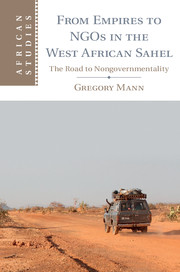Crossref Citations
This Book has been
cited by the following publications. This list is generated based on data provided by Crossref.
Mc Laughlin, Fiona
2015.
Linguistic warscapes of northern Mali.
Linguistic Landscape. An international journal,
Vol. 1,
Issue. 3,
p.
213.
Mann, Gregory
2015.
Experience as Evidence in Africanist Historiography.
History in Africa,
Vol. 42,
Issue. ,
p.
279.
Dedieu, Jean-Philippe
and
Mbodj-Pouye, Aissatou
2016.
The first collective protest of black African migrants in postcolonial France (1960–1975): a struggle for housing and rights.
Ethnic and Racial Studies,
Vol. 39,
Issue. 6,
p.
958.
MBODJ-POUYE, AÏSSATOU
2016.
Fixed abodes: Urban emplacement, bureaucratic requirements, and the politics of belonging among West African migrants in Paris.
American Ethnologist,
Vol. 43,
Issue. 2,
p.
295.
O'Sullivan, Kevin
Hilton, Matthew
and
Fiori, Juliano
2016.
Humanitarianisms in context.
European Review of History: Revue européenne d'histoire,
Vol. 23,
Issue. 1-2,
p.
1.
Hernann, Andrew
2016.
Discourse in crisis: situating slavery, jihad and military intervention in northern Mali.
Dialectical Anthropology,
Vol. 40,
Issue. 3,
p.
267.
Serres, Thomas
2016.
Ordoliberalism Beyond Borders:The EU and Algeria's Human Capital.
SSRN Electronic Journal,
Hames, John
2017.
“A river is not a boundary”: interplays of national and linguistic citizenship in Pulaar language activism.
Canadian Journal of African Studies / Revue canadienne des études africaines,
Vol. 51,
Issue. 1,
p.
103.
Charbonneau, Bruno
2017.
Intervention in Mali: building peace between peacekeeping and counterterrorism.
Journal of Contemporary African Studies,
Vol. 35,
Issue. 4,
p.
415.
Giannini, Alessandra
Krishnamurthy, P. Krishna
Cousin, Rémi
Labidi, Naouar
and
Choularton, Richard J.
2017.
Climate risk and food security in Mali: A historical perspective on adaptation.
Earth's Future,
Vol. 5,
Issue. 2,
p.
144.
Mbaku, John Mukum
2017.
Constitutions and Citizenship: Lessons for African Countries.
International and Comparative Law Review,
Vol. 17,
Issue. 1,
p.
7.
Rossi, Benedetta
2017.
From Unfree Work to Working for Free: Labor, Aid, and Gender in the Nigerien Sahel, 1930–2000.
International Labor and Working-Class History,
Vol. 92,
Issue. ,
p.
155.
Hendrickson, Burleigh
2017.
From the Archives to the Streets.
French Historical Studies,
Vol. 40,
Issue. 2,
p.
319.
Mann, Gregory
2017.
French Africa's Futures Past.
Comparative Studies of South Asia, Africa and the Middle East,
Vol. 37,
Issue. 2,
p.
399.
Hoffman, Barbara G.
2017.
The Roles of the Griot in the Future of Mali: A Twenty-First-Century Institutionalization of a Thirteenth-Century Traditional Institution.
African Studies Review,
Vol. 60,
Issue. 1,
p.
101.
Hames, John
2017.
Language Activism on the Airwaves: Pulaar Radio Broadcasting in the Senegal River Valley.
Communication, Culture & Critique,
Vol. 10,
Issue. 4,
p.
657.
Whitehouse, Bruce
2017.
Political Participation and Mobilization after Mali’s 2012 Coup.
African Studies Review,
Vol. 60,
Issue. 1,
p.
15.
WIEMERS, ALICE
2017.
‘WHEN THE CHIEF TAKES AN INTEREST’: DEVELOPMENT AND THE REINVENTION OF ‘COMMUNAL’ LABOR IN NORTHERN GHANA, 1935–60.
The Journal of African History,
Vol. 58,
Issue. 2,
p.
239.
Barré, Louise
2018.
« Mettre son nom » : revendications familiales au sein de procédures d’identification (Côte d’Ivoire 1950-1970).
Genèses,
Vol. n° 112,
Issue. 3,
p.
12.
Thornberry, Elizabeth
2018.
Colonizing Consent.



